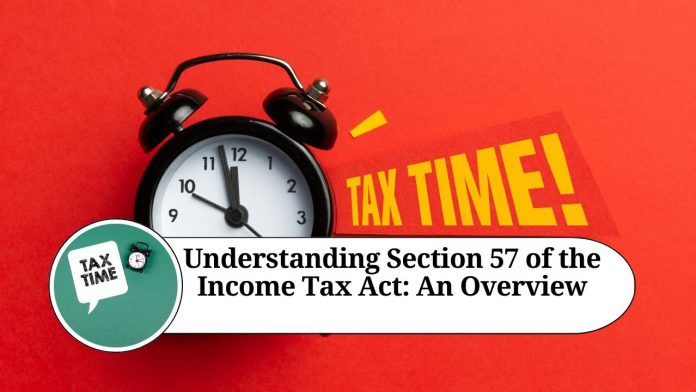Section 57 of the Income Tax Act is a crucial provision that determines the deductions that can be claimed by taxpayers against the income earned by them. The section provides for specific deductions that can be claimed under the head of “Income from Other Sources” and is applicable to both individuals and companies. In this blog, we will delve deeper into Section 57 of the Income Tax Act and explore its various aspects.
Income from Other Sources
As per the Income Tax Act, any income that is not covered under the four primary heads of income, namely, “Salary,” “House Property,” “Business or Profession,” and “Capital Gains,” is considered to be “Income from Other Sources.” This includes interest earned on bank deposits, rental income, income from winnings or lotteries, income from royalty, and income from gifts received, among others.
Deductions Under Section 57
Section 57 of the Income Tax Act allows for specific deductions to be claimed against income earned from other sources. These deductions are as follows:
- Standard Deduction
A standard deduction of 30% of the income earned from other sources is allowed to be claimed as a deduction. This deduction is available to all taxpayers, including individuals and companies, and can be claimed irrespective of whether any expenses were incurred to earn the income.
- Deduction for Expenses Incurred
In addition to the standard deduction, taxpayers can also claim deductions for expenses incurred to earn the income from other sources. However, the expenses must be wholly and exclusively incurred for the purpose of earning the income.
For instance, if a taxpayer has earned rental income from a property, they can claim deductions for expenses such as property tax, repair and maintenance expenses, and insurance premium paid on the property, among others. However, it is essential to ensure that all expenses claimed as deductions are adequately supported by documentary evidence.
- Deduction for Interest on Borrowed Capital
Taxpayers can also claim a deduction for interest paid on borrowed capital to earn the income from other sources. For instance, if a taxpayer has taken a loan to purchase a property that is rented out, they can claim a deduction for the interest paid on the loan as a deduction against the rental income.
- Deduction for Gifts Received
If a taxpayer has received any gifts during the financial year, they can claim a deduction for any expenses incurred in relation to the gifts. However, it is essential to ensure that the expenses claimed as deductions are wholly and exclusively incurred for the purpose of earning the income.
Conclusion
Section 57 of the Income Tax Act provides for deductions that can be claimed by taxpayers against the income earned from other sources. It is essential to understand the provisions of this section and ensure that all deductions claimed are supported by adequate documentary evidence. Additionally, taxpayers must ensure that all expenses claimed as deductions are wholly and exclusively incurred for the purpose of earning the income.
Read more useful content:
- section 234e of income tax act
- section 286 of income tax act
- section 90a of income tax act
- section 40a(7) of income tax act
- section 226(3) of income tax act
- section 24 of income tax act
Frequently Asked Questions (FAQs)
Q: What is Section 57 of the Income Tax Act?
A: Section 57 of the Income Tax Act provides for specific deductions that can be claimed against income earned from other sources. It is applicable to both individuals and companies.
Q: What is “Income from Other Sources”?
A: “Income from Other Sources” refers to any income that is not covered under the four primary heads of income, namely, “Salary,” “House Property,” “Business or Profession,” and “Capital Gains.” This includes interest earned on bank deposits, rental income, income from winnings or lotteries, income from royalty, and income from gifts received, among others.
Q: What deductions can be claimed under Section 57 of the Income Tax Act?
A: The deductions that can be claimed under Section 57 of the Income Tax Act are as follows:
- Standard Deduction: A standard deduction of 30% of the income earned from other sources can be claimed as a deduction.
- Deduction for Expenses Incurred: Taxpayers can claim deductions for expenses incurred to earn the income from other sources. However, the expenses must be wholly and exclusively incurred for the purpose of earning the income.
- Deduction for Interest on Borrowed Capital: Taxpayers can claim a deduction for interest paid on borrowed capital to earn the income from other sources.
- Deduction for Gifts Received: Taxpayers can claim a deduction for any expenses incurred in relation to gifts received during the financial year.
Q: Can individuals and companies both claim deductions under Section 57 of the Income Tax Act?
A: Yes, both individuals and companies can claim deductions under Section 57 of the Income Tax Act.
Q: Are there any restrictions on the amount of deductions that can be claimed under Section 57 of the Income Tax Act?
A: No, there are no restrictions on the amount of deductions that can be claimed under Section 57 of the Income Tax Act, as long as they are supported by adequate documentary evidence and are wholly and exclusively incurred for the purpose of earning the income.
Q: Is it necessary to submit documentary evidence to claim deductions under Section 57 of the Income Tax Act?
A: Yes, it is essential to submit documentary evidence to claim deductions under Section 57 of the Income Tax Act. This is to ensure that all deductions claimed are genuine and have been incurred for the purpose of earning the income.




















